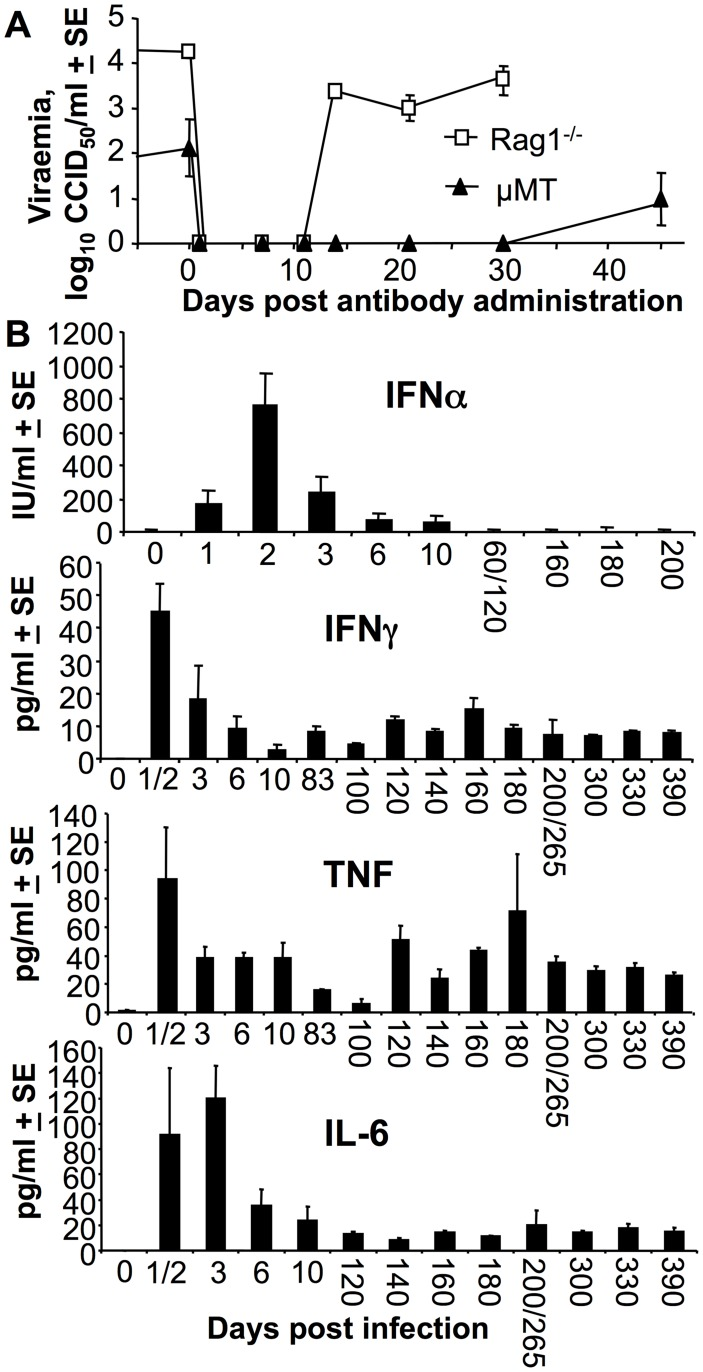Multiple immune factors are involved in controlling acute and chronic chikungunya virus infection.
The recent epidemic of the arthritogenic alphavirus, chikungunya virus (CHIKV) has prompted a quest to understand the correlates of protection against virus and disease in order to inform development of new interventions. Herein we highlight the propensity of CHIKV infections to persist long term, both as persistent, steady-state, viraemias in multiple B cell deficient mouse strains, and as persistent RNA (including negative-strand RNA) in wild-type mice. The knockout mouse studies provided evidence for a role for T cells (but not NK cells) in viraemia suppression, and confirmed the role of T cells in arthritis promotion, with vaccine-induced T cells also shown to be arthritogenic in the absence of antibody responses. However, MHC class II-restricted T cells were not required for production of anti-viral IgG2c responses post CHIKV infection. The anti-viral cytokines, TNF and IFNγ, were persistently elevated in persistently infected B and T cell deficient mice, with adoptive transfer of anti-CHIKV antibodies unable to clear permanently the viraemia from these, or B cell deficient, mice. The NOD background increased viraemia and promoted arthritis, with B, T and NK deficient NOD mice showing high-levels of persistent viraemia and ultimately succumbing to encephalitic disease. In wild-type mice persistent CHIKV RNA and negative strand RNA (detected for up to 100 days post infection) was associated with persistence of cellular infiltrates, CHIKV antigen and stimulation of IFNα/β and T cell responses. These studies highlight that, secondary to antibodies, several factors are involved in virus control, and suggest that chronic arthritic disease is a consequence of persistent, replicating and transcriptionally active CHIKV RNA.
Authors
Yee Suan Poo; Penny A Rudd; Joy Gardner; Jane A C Wilson; Thibaut Larcher; Marie-Anne Colle; Thuy T Le; Helder I Nakaya; David Warrilow; Richard Allcock; Helle Bielefeldt-Ohmann; Wayne A Schroder; Alexander A Khromykh; José A Lopez; Andreas Suhrbier
External link
Publication Year
Publication Journal
Associeted Project
Microbiology or Immunology
Lista de serviços
-
Gene regulatory and signaling networks exhibit distinct topological distributions of motifs.Gene regulatory and signaling networks exhibit distinct topological distributions of motifs.
-
Gene signatures of autopsy lungs from obese patients with COVID-19.Gene signatures of autopsy lungs from obese patients with COVID-19.
-
Network Medicine: Methods and ApplicationsNetwork Medicine: Methods and Applications
-
ACE2 Expression Is Increased in the Lungs of Patients With Comorbidities Associated With Severe COVID-19.ACE2 Expression Is Increased in the Lungs of Patients With Comorbidities Associated With Severe COVID-19.
-
Drug repositioning for psychiatric and neurological disorders through a network medicine approach.Drug repositioning for psychiatric and neurological disorders through a network medicine approach.
-
Linking proteomic alterations in schizophrenia hippocampus to NMDAr hypofunction in human neurons and oligodendrocytes.Linking proteomic alterations in schizophrenia hippocampus to NMDAr hypofunction in human neurons and oligodendrocytes.
-
In-depth analysis of laboratory parameters reveals the interplay between sex, age, and systemic inflammation in individuals with COVID-19.In-depth analysis of laboratory parameters reveals the interplay between sex, age, and systemic inflammation in individuals with COVID-19.
-
The evolution of knowledge on genes associated with human diseasesThe evolution of knowledge on genes associated with human diseases
-
Network vaccinology.Network vaccinology.
-
Pyruvate kinase M2 mediates IL-17 signaling in keratinocytes driving psoriatic skin inflammationPyruvate kinase M2 mediates IL-17 signaling in keratinocytes driving psoriatic skin inflammation
-
Transcriptome analysis of six tissues obtained post-mortem from sepsis patientsTranscriptome analysis of six tissues obtained post-mortem from sepsis patients
-
Gene Signatures of Symptomatic and Asymptomatic Clinical-Immunological Profiles of Human Infection by Leishmania (L.) chagasi in Amazonian BrazilGene Signatures of Symptomatic and Asymptomatic Clinical-Immunological Profiles of Human Infection by Leishmania (L.) chagasi in Amazonian Brazil
-
In vitro morphological profiling of T cells predicts clinical response to natalizumab therapy in patients with multiple sclerosis.In vitro morphological profiling of T cells predicts clinical response to natalizumab therapy in patients with multiple sclerosis.
-
Integrative immunology identified interferome signatures in uveitis and systemic disease-associated uveitis.Integrative immunology identified interferome signatures in uveitis and systemic disease-associated uveitis.
-
Gene regulatory networks analysis for the discovery of prognostic genes in gliomas.Gene regulatory networks analysis for the discovery of prognostic genes in gliomas.
-
Revealing shared molecular drivers of brain metastases from distinct primary tumors.Revealing shared molecular drivers of brain metastases from distinct primary tumors.

